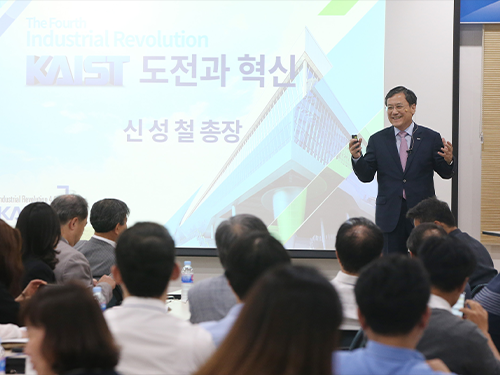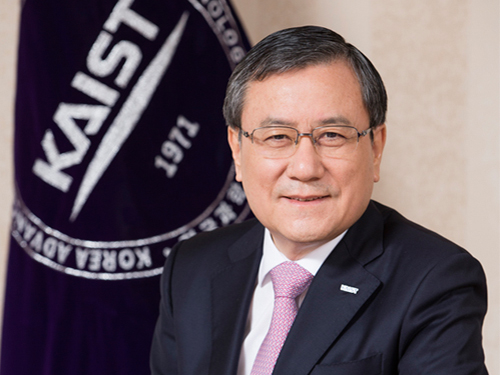Industry+4.0
-
 Policy Debate Series for Industry 4.0
(Photo caption: President Shin takes the podium as the first speaker of a year-long monthly policy dabate series on Industry 4.0 on May 11.)
KAIST will kick off a monthly policy debate series on Industry 4.0 every Thursday from May 11 at the Startup KAIST building. The year-long series, featuring professors from key technology fields associated with Industry 4.0, is designed to help policy makers from government, industry, and research institutes respond better to the ramifications that Industry 4.0 brings about in each sector.
The series will help them establish the vision and strategy that will work for the new industrial environment to take the lead in the new industrial era.
Twelve professors, including President Sung-Chul Shin, from departments that are researching emerging technologies will speak on the megatrend of new technology, while facilitating debates and Q& A sessions with participants.
The participants will include officials from the government complexes in Sejong and Daejeon cities, government-funded research institutes in Daejeon, and businessmen, among others. For registration, please go to https://startup.kaist.ac.kr/register.
Schedule
Speaker
Theme
May 11
President Sung-Chul Shin
Challenges and Innovations of KAIST in the Era of Industry 4.0
June 8
Professor Jonghwan Kim
Machine Intelligence and Deep Learning
July 6
Professor Jun Ho Oh
Robot Technology and the Future
Aug. 3
Professor Hyunchul Shim
Unmanned Vehicle Technology and Industry 4.0
Sept. 7
Professor Hawoong Jeong
Complex Systems and Data Science
Oct. 12
Professor Yongdae Kim
Technology, Policy, and the Fostering of Talents: Industry 4.0 and Information Protection
Nov. 9
Professor Sang Yup Lee
The Role of Biotechnology in Industry 4.0
Dec. 7
Professor Meeyoung Cha
AI-Based Research for Fake News Detection
2018 Jan. 4
Professor Joungho Kim
Innovation for the Korean Semiconductor Industry: Kim’s Law
Feb. 8
Professor Jaekyun Moon
Education for Industry 4.0
March 8
Professor Sang Kil Cha
Artificial Intelligence Cyber Warfare: Its Present and Future
April 5
Professor Jaeseung Jeong
The Future of Brain Engineering and Artificial Intelligence
2017.05.08 View 11817
Policy Debate Series for Industry 4.0
(Photo caption: President Shin takes the podium as the first speaker of a year-long monthly policy dabate series on Industry 4.0 on May 11.)
KAIST will kick off a monthly policy debate series on Industry 4.0 every Thursday from May 11 at the Startup KAIST building. The year-long series, featuring professors from key technology fields associated with Industry 4.0, is designed to help policy makers from government, industry, and research institutes respond better to the ramifications that Industry 4.0 brings about in each sector.
The series will help them establish the vision and strategy that will work for the new industrial environment to take the lead in the new industrial era.
Twelve professors, including President Sung-Chul Shin, from departments that are researching emerging technologies will speak on the megatrend of new technology, while facilitating debates and Q& A sessions with participants.
The participants will include officials from the government complexes in Sejong and Daejeon cities, government-funded research institutes in Daejeon, and businessmen, among others. For registration, please go to https://startup.kaist.ac.kr/register.
Schedule
Speaker
Theme
May 11
President Sung-Chul Shin
Challenges and Innovations of KAIST in the Era of Industry 4.0
June 8
Professor Jonghwan Kim
Machine Intelligence and Deep Learning
July 6
Professor Jun Ho Oh
Robot Technology and the Future
Aug. 3
Professor Hyunchul Shim
Unmanned Vehicle Technology and Industry 4.0
Sept. 7
Professor Hawoong Jeong
Complex Systems and Data Science
Oct. 12
Professor Yongdae Kim
Technology, Policy, and the Fostering of Talents: Industry 4.0 and Information Protection
Nov. 9
Professor Sang Yup Lee
The Role of Biotechnology in Industry 4.0
Dec. 7
Professor Meeyoung Cha
AI-Based Research for Fake News Detection
2018 Jan. 4
Professor Joungho Kim
Innovation for the Korean Semiconductor Industry: Kim’s Law
Feb. 8
Professor Jaekyun Moon
Education for Industry 4.0
March 8
Professor Sang Kil Cha
Artificial Intelligence Cyber Warfare: Its Present and Future
April 5
Professor Jaeseung Jeong
The Future of Brain Engineering and Artificial Intelligence
2017.05.08 View 11817 -
 Dr. Sung-Chul Shin Selected 16th President of KAIST
(President Sung-Chul Shin)
The KAIST Board of Trustees elected Professor Sung-Chul Shin of the Department of Physics the 16th president of KAIST on February 21. Professor Shin succeeds President Sung-Mo Kang whose four-year term will end on February 23. He is the first KAIST alumnus to serve as its president.
The Board of Trustees announced, “We believe that Professor Shin’s scientific achievement, outstanding leadership, and clear vision will serve KAIST faculty, students, and staff very well. He will be the best person to help KAIST leap forward in the four years ahead.”
The newly-elected president said, “I am humbled and honored to have been elected to lead such a prestigious institute of Korea. Aiming to be one of the top ten global universities, KAIST will continue to innovate its systems.” Previously, Dr. Shin led the Daegu Gyeongbuk Institute of Science and Technology (DGIST) for six years as president since 2011.
Professor Shin joined the KAIST faculty in 1989. He graduated from Seoul National University and then earned his MS degree in condensed matter physics at KAIST in 1977. After earning his Ph.D. in material physics at Northwestern University in 1984, he worked at Eastman Kodak Research Labs as a senior research scientist for five years.
Before heading to DGIST, President Shin held key administrative positions at KAIST from the early 1990s including dean of planning, dean of the international office, and vice-dean of student affairs. During President Robert Laughlin’s tenure, the first foreign president at KAIST, he served as vice-president for two years from 2004. He also served on the Presidential Advisory Council on Science and Technology of the Korean government as vice chairperson from 2015 to 2016.
A renowned scholar in the field of nanoscience, President Shin’s research focuses on the artificial synthesis and characterization of nonmagnetic materials, magnetic anisotropy, and magneto-optical phenomena. He leads the Laboratory for Nanospinics of Spintronic Materials at KAIST and has published in 290 journals while holding 37 patents.
A fellow in the American Physical Society (APS) since 2008, he was the president of the Korean Physical Society from 2011 to 2012. He has been on the editorial board of J. Magnetism and Magnetic Materials from 2009 and was the first Korean recipient of the Asian Union of Magnetics Societies (AUMS) Award, which recognizes outstanding scientists in the field of magnetics.
President Shin envisions making KAIST’s research and education more competitive through continuing innovation. His innovation efforts will extend to the five key areas of education, research, technology commercialization, globalization, and future planning.
Among his priorities, he emphasizes multidisciplinary studies and leadership training for students. He plans to focus on undeclared major courses for undergraduates to help them expand their experience and exposure to diverse disciplines. This approach will help create well-rounded engineers, scientists, and entrepreneurs by enabling them to develop skills while leveraging a strong connection to the arts, humanities, and social sciences.
To better respond to Industry 4.0, which calls for convergence studies and collaborative work, he proposed establishing a ‘Convergence Innovation System’ by strategically selecting 10 flagship convergence research groups. In order to accelerate the technology commercialization and ecosystem of start-ups, he will strengthen entrepreneurship education, making it a prerequisite requirement for students. President Shin said he will spare no effort to incubate and spin-off ventures in which KAIST technology is being transferred. For globalization efforts, he plans to increase the ratio of foreign faculty from 9 percent to 15 percent, while doubling the current foreign student enrollment ratio of 5 percent. For future strategic innovation, he will implement a long-term innovation strategic plan dubbed ‘Vision 2031.’
2017.02.22 View 13028
Dr. Sung-Chul Shin Selected 16th President of KAIST
(President Sung-Chul Shin)
The KAIST Board of Trustees elected Professor Sung-Chul Shin of the Department of Physics the 16th president of KAIST on February 21. Professor Shin succeeds President Sung-Mo Kang whose four-year term will end on February 23. He is the first KAIST alumnus to serve as its president.
The Board of Trustees announced, “We believe that Professor Shin’s scientific achievement, outstanding leadership, and clear vision will serve KAIST faculty, students, and staff very well. He will be the best person to help KAIST leap forward in the four years ahead.”
The newly-elected president said, “I am humbled and honored to have been elected to lead such a prestigious institute of Korea. Aiming to be one of the top ten global universities, KAIST will continue to innovate its systems.” Previously, Dr. Shin led the Daegu Gyeongbuk Institute of Science and Technology (DGIST) for six years as president since 2011.
Professor Shin joined the KAIST faculty in 1989. He graduated from Seoul National University and then earned his MS degree in condensed matter physics at KAIST in 1977. After earning his Ph.D. in material physics at Northwestern University in 1984, he worked at Eastman Kodak Research Labs as a senior research scientist for five years.
Before heading to DGIST, President Shin held key administrative positions at KAIST from the early 1990s including dean of planning, dean of the international office, and vice-dean of student affairs. During President Robert Laughlin’s tenure, the first foreign president at KAIST, he served as vice-president for two years from 2004. He also served on the Presidential Advisory Council on Science and Technology of the Korean government as vice chairperson from 2015 to 2016.
A renowned scholar in the field of nanoscience, President Shin’s research focuses on the artificial synthesis and characterization of nonmagnetic materials, magnetic anisotropy, and magneto-optical phenomena. He leads the Laboratory for Nanospinics of Spintronic Materials at KAIST and has published in 290 journals while holding 37 patents.
A fellow in the American Physical Society (APS) since 2008, he was the president of the Korean Physical Society from 2011 to 2012. He has been on the editorial board of J. Magnetism and Magnetic Materials from 2009 and was the first Korean recipient of the Asian Union of Magnetics Societies (AUMS) Award, which recognizes outstanding scientists in the field of magnetics.
President Shin envisions making KAIST’s research and education more competitive through continuing innovation. His innovation efforts will extend to the five key areas of education, research, technology commercialization, globalization, and future planning.
Among his priorities, he emphasizes multidisciplinary studies and leadership training for students. He plans to focus on undeclared major courses for undergraduates to help them expand their experience and exposure to diverse disciplines. This approach will help create well-rounded engineers, scientists, and entrepreneurs by enabling them to develop skills while leveraging a strong connection to the arts, humanities, and social sciences.
To better respond to Industry 4.0, which calls for convergence studies and collaborative work, he proposed establishing a ‘Convergence Innovation System’ by strategically selecting 10 flagship convergence research groups. In order to accelerate the technology commercialization and ecosystem of start-ups, he will strengthen entrepreneurship education, making it a prerequisite requirement for students. President Shin said he will spare no effort to incubate and spin-off ventures in which KAIST technology is being transferred. For globalization efforts, he plans to increase the ratio of foreign faculty from 9 percent to 15 percent, while doubling the current foreign student enrollment ratio of 5 percent. For future strategic innovation, he will implement a long-term innovation strategic plan dubbed ‘Vision 2031.’
2017.02.22 View 13028